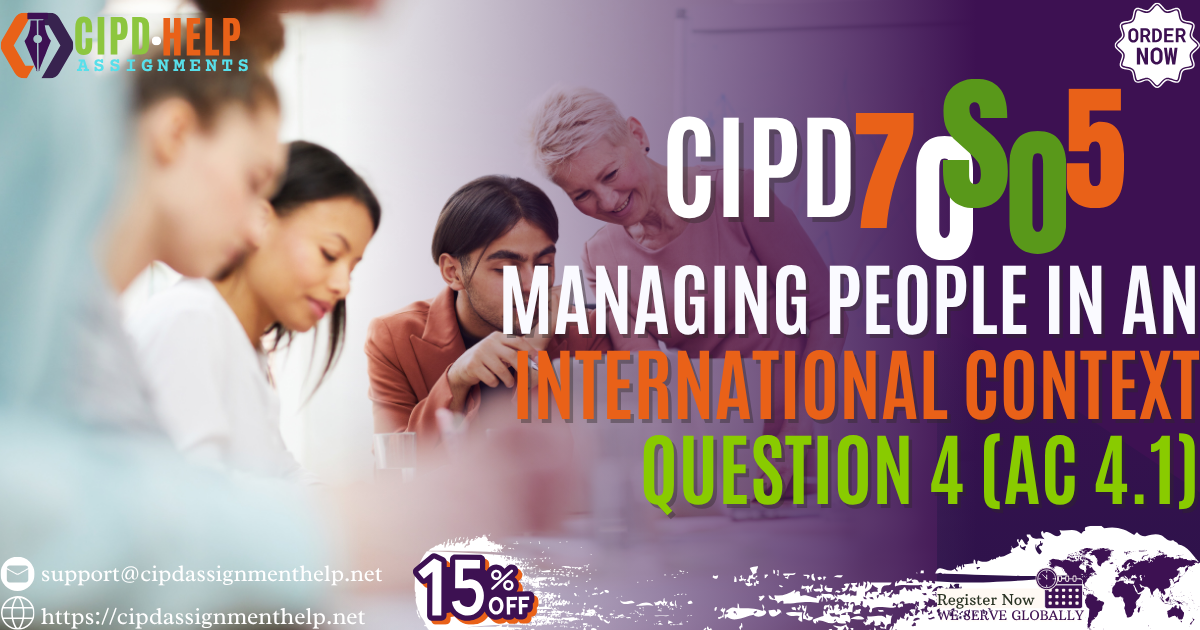7OS05 Managing people in An International Context Question 4 (AC 4.1)
There’s something grounding about “7OS05 Managing people in An International Context Question 4 (AC 4.1).” It’s not about building perfect HR systems or ticking strategy boxes. It’s about people, how they respond, push back, adapt, or withdraw when systems fail to account for cultural difference. You start with policy, but end up dealing with relationships, trust, and sometimes silence.
We’ve had students say they went in expecting spreadsheets, and came out with case stories they still think about months later. That’s the thing, it’s often the messy, human stuff that teaches you the most.
Case study
You work in a senior people management role in a UK-based clothing retail and distribution company that specialises in sportswear. It is called Fitter Threads Ltd and has grown considerably in recent years with the successful development of a big online store. The business model involves commissioning, sourcing and shipping products from factories based in developing countries for distribution, in the main, to customers in Europe and North America. Profit margins are excellent, but in recent years, as the company has expanded rapidly and new suppliers have been engaged, managers have been concerned about reliability of supply. Orders are not always delivered to the warehouse on time, and there have been justified complaints made by customers about a decline in product quality.
Senior managers have thus made the decision to acquire some garment factories in Asia and to start managing them directly. It is a risky decision, as the company has no experience at all of managing operations overseas, but it is considered strategically necessary in order to permit further expansion of the core business. Three manufacturing sites have been identified, all of which have established factories which already supply Fitter Threads Ltd, based in different countries. Deals have been done and in the next few weeks all three will become wholly-owned subsidiaries of the UK-based company. A long-term approach is being taken as far as people management strategy is concerned. Change will be introduced steadily over the next two years as investments are made in the new manufacturing operations with a view both to expanding them and upgrading plant and equipment. Meanwhile a two-pronged approach will be taken to the development of international managers:
i) Three experienced Fitter Threads Ltd personnel will be appointed to join the established management teams in each of the sites. This means that a total of nine UK nationals will be expatriated (potentially with their families) to work at senior levels in the newly acquired operations for a period of three to five years.
ii) Three experienced managers from each of the Asian factories will be invited to work in Fitter Threads Ltd’s UK operations over the coming year with a view to learning about the company’s systems, its culture and, particularly, its expectations in respect of people management. This means that nine people (again potentially with their families) will temporarily be ‘inpatriated’ from Asia to the UK.
Senior managers are particularly concerned to ensure that their new operations observe corporate norms in areas such as business ethics, environmental protection, health and safety, employee voice and fair recruitment practices. These all currently accord with ‘best practice’ principles as this term is generally understood in the UK. Managers are aware that such norms are presently very often not observed in their newly acquired operations as this is not common practice in the garment industry in the countries they are investing in. They understand that this will be challenging, but are very concerned not least for public relations reasons, to ensure that basic standards are maintained globally across all their sites in the future.
You are asked to provide advice to Fitter Threads Ltd’s senior management team. For the purposes of this assessment, you are free to choose which three locations in Asia you wish to research and write about. You must, however, choose three different countries.
Your final report should be 4000 words (+/- 10%) in length and should address each of the following questions fully and directly:
Question 4 (AC 4.1): Critically discuss the challenges Fitter Threads Ltd will face in balancing the need to maintain global approaches to people management and the management of change, with the need to manage according to local norms and expectations in their new overseas operations. Illustrate your answer with an example.
Step-by-step breakdown
Step 1: Understand what the question is really asking
Let’s not overcomplicate this, but let’s not undercook it either.
This question is about the tension or even contradiction, sometimes between two competing forces:
- Maintaining global consistency in how people are managed (think ethics, health and safety, employee voice, the stuff senior UK managers care about deeply), and
- Respecting local expectations, norms, customs, and ways of doing things in whichever countries Fitter Threads has just expanded into.
So, can a UK-based company walk into, say, Bangladesh, India, and Vietnam and say “this is how we do people management, follow it to the letter”? Maybe they can. But will it actually work on the ground? Will people understand it? Will they accept it? Will it feel natural, or will it backfire?
That’s the heart of the question.
Step 2: Anchor everything in the case study
Before we go theoretical, we need to stay grounded. This isn’t a generic question, it’s about Fitter Threads Ltd, and there are a few specific things we need to remember:
- They’ve bought three factories in three different Asian countries.
- These factories already existed, and had established ways of doing things.
- Fitter Threads is now trying to introduce UK-style “best practices” in people management, ethics, fair recruitment, employee voice, health and safety.
- They’re sending nine UK nationals to work there as expatriates.
- They’re also bringing in nine Asian managers to the UK to learn how Fitter Threads does things.
- There are public relations risks if ethical and employment practices aren’t cleaned up.
So everything you write needs to loop back to that context. This is a company with no prior international operations experience, and they’ve just committed to something very complex. It’s not just a few new hires; they now own factories, that’s a different scale entirely.
Step 3: Choose your three countries and why
Pick countries where the contrast with UK practices is likely to be most pronounced. Let’s go with:
- Bangladesh – massive player in garment manufacturing, but poor labour protections.
- Vietnam – rising textile hub, more stable than others but still culturally different.
- India – complex labour market, formal and informal sectors, and vast social hierarchy.
You don’t need to deep dive into all three equally. But having these in the background helps show that you understand why balancing global and local approaches is a real issue, not just a theory.
Now, let’s build the content
The core challenge: Global vs Local
Honesty, this is where it gets messy. You’ve got UK standards, UK expectations, and a deeply held belief among senior managers that these are non-negotiable. That makes sense, in the UK, employees expect a voice. They expect fair hiring processes. They expect health and safety protections. And Fitter Threads’ brand relies, at least partly, on looking responsible.
But now imagine you’re in Dhaka. Or in a rural province outside Ho Chi Minh. Labour laws aren’t the same. Enforcing contracts might be inconsistent. Hierarchies are more rigid. Workers may not even expect to speak up, it might be considered disrespectful.
So straight away you have a clash.
If managers try to impose the UK model without modification, they risk confusing or alienating the local workforce. But if they adapt too much to local norms, they risk drifting away from their global principles and potentially damaging the brand or losing internal coherence.
It’s a bit like walking a tightrope. You have to adjust your balance constantly. One misstep, and either the values fall, or the local workforce disengages.
Let’s look at specific people management areas with real tension
1. Health and Safety
In the UK, risk assessments, protective equipment, training, they’re expected. You’d have unions involved, too.
In Bangladesh, many factories operate with minimal safety oversight. The Rana Plaza collapse is still a fresh wound for the industry.
If Fitter Threads tries to replicate UK standards too quickly, they’ll likely face resistance from middle managers who’ve never worked that way. Equipment might not even be available locally. Training may need to be translated, not just linguistically, but culturally. It’s not just about saying “wear gloves”; it’s explaining why in a way that makes sense to people who’ve never worked under such conditions.
So the challenge here is how far to push, and how fast.
2. Employee Voice
This one’s delicate. In the UK, it’s almost taken for granted that employees can express concerns. Even junior staff can speak up. That’s part of how fairness is maintained.
But in India? Vietnam? There may be cultural reluctance to speak up, especially in hierarchical settings. There may be no existing channels for doing so.
So even if Fitter Threads sets up employee forums, they may not get used. Or worse, employees might feel exposed by speaking.
So we’re faced with a bit of a dilemma: Should the company wait and observe first, or force through the creation of voice structures, even if they go unused at first?
There’s no perfect answer, but what you could argue is that a slower, trust-building approach might be more realistic. Bring in voice mechanisms after managers have earned trust.
3. Recruitment practices
UK practices expect fairness, transparency, anti-discrimination policies.
In Vietnam or Bangladesh, recruitment may happen informally, through personal networks, sometimes even via family recommendations.
If Fitter Threads suddenly demands that all hiring follows a structured competency-based model, local hiring managers might simply go through the motions, but still hire who they were going to hire anyway.
So, do you push for transparency from day one, or do you gradually shift expectations over time?
Again, the pace of change becomes crucial.
Expatriates and Inpatriates – a real-world lever or a friction point?
You’ve got nine UK managers going to Asia. They’ll try to model and spread UK norms. But they’re entering a context they don’t understand, they may lack language skills, local connections, or cultural sensitivity. There’s a risk they’ll come across as imposing or out of touch.
On the other side, nine Asian managers will come to the UK, and they’ll likely learn a lot. But once they return, will they be empowered to actually implement change? Or will they be constrained by local systems?
So the model here has potential, but it’s fragile. For it to work, both groups need support. Culture shock isn’t just a side issue, it can become a serious barrier if it’s not anticipated.
Practical Example (woven into the discussion)
Let’s say that one of the newly acquired factories in Bangladesh continues to recruit workers via informal community channels, often through a senior worker recommending a niece or nephew. This method has worked for years.
A UK expatriate manager insists on shifting to a structured application and interview model, but within weeks, production slows. Supervisors resist the process. New hires come in late or leave early. Informal discipline rises.
Here, you could reflect: did the UK manager misunderstand the role of social cohesion in local hiring? Perhaps the new model unintentionally undermined trust, especially if family recommendations were previously linked to loyalty.
This isn’t to say you should accept all local norms. Some genuinely need reform, especially those that disadvantage women or promote inequality. But the pace, method and framing of that reform matters. You can’t just flip a switch.
Summary thoughts
So, in the end, Fitter Threads Ltd is facing more than just a logistical challenge. They’re dealing with identity. Who are they, globally? Can they stay true to UK values while becoming a truly international firm?
And really, they’re going to make mistakes. That’s okay. The important part is that they approach the balance with humility, with real local listening, and with a mindset that’s firm on principles but flexible in methods.
That balance? It’s never static. You adjust constantly. And over time, you might find that some of your “UK” values aren’t UK at all, they’re just good practice, and can be embraced anywhere, when introduced with care.
CIPD Level 7 (7OS05) Assignment Answer: Question 4 (AC 4.1)
Fitter Threads Ltd, a UK-based sportswear retailer and distributor, is embarking on an ambitious expansion into direct overseas manufacturing. With three garment factories acquired in Asia, this shift represents a strategic attempt to stabilise product quality and delivery reliability. However, the company now finds itself entering uncharted waters: managing people in unfamiliar contexts. Balancing consistent global expectations, particularly UK-based people management norms with deeply rooted local practices will likely prove more difficult than anticipated.
A key complexity lies in the simultaneous need to preserve global consistency, especially in areas like ethical standards, employee voice, recruitment fairness and safety, while also respecting the deeply embedded customs and employment frameworks of the host countries. These local norms may diverge significantly from the UK context. If imposed too rigidly, global practices risk alienating local staff or producing superficial compliance. Yet, without a clear framework, there is a danger of drifting from the company’s stated commitments, which include fairness, transparency, and reputational accountability.
Let us examine three selected countries: Bangladesh, India, and Vietnam. All are recognised for their established roles in textile manufacturing but vary culturally, economically and legislatively. Their inclusion also highlights distinct regional tensions that could emerge.
Health and Safety Expectations
In the UK, occupational health and safety is tightly regulated, with mandatory training, protective equipment and routine inspections. Workers expect and demand these protections. Fitter Threads has institutionalised these expectations.
In Bangladesh, where informal enforcement of safety regulations is more common, and where cost-cutting often trumps compliance, such protections may not be standard. Imposing UK-style H&S frameworks too quickly could face both logistical and cultural resistance. For example, sourcing protective equipment locally may be limited. Moreover, line managers may prioritise production output over procedural safety without recognising the long-term cost of injury or burnout.
Real change will require more than rulebooks; it will demand new mindsets, particularly from local supervisors and plant managers. Gradual training programmes, supported by consistent leadership modelling from expatriates, may help build that foundation. But expectations must be realistic. Forcing change too fast could create the illusion of compliance, without genuine behavioural shifts.
Voice and Participation Structures
Employee voice in the UK is protected both culturally and legally. Forums, surveys, open-door policies, and unions are part of workplace reality. But in parts of Asia, particularly in India and Vietnam, the idea of junior employees openly questioning managers may seem disrespectful or inappropriate.
Trying to replicate UK models of consultation or feedback in these contexts could fall flat. Employees might stay silent, not out of agreement, but from fear or discomfort. Even where voice structures exist, they may be symbolic, used to demonstrate compliance rather than invite real participation.
For example, in Vietnam, deference to authority is often a sign of loyalty. If an expatriate manager encourages direct feedback and receives none, they might assume satisfaction. But silence doesn’t always mean consent.
A more feasible approach might involve creating informal, trust-based channels first, for instance, peer-led meetings or small group feedback sessions. Once staff become more familiar with open communication styles, more formal structures can be introduced with greater success.
Recruitment Norms
UK hiring practices prioritise fairness, transparency and clear role requirements. The use of structured interviews, person specifications, and competency models is routine.
Contrast that with common practices in India, where hiring through networks, referrals, and social recommendations often dominate. In Bangladesh, local hiring may rely on proximity or family ties. Trying to fully replace these approaches with UK systems may lead to confusion or passive resistance.
A Bangladesh-based line manager may simply “go through the motions” of structured interviewing, while still hiring a cousin’s friend for a role. This isn’t always about corruption or nepotism—often, it’s about trust and cultural familiarity.
Rather than reject these methods outright, Fitter Threads could consider blending local expectations with global standards. For example, keeping referrals in place, but requiring basic screening or probation procedures. Over time, more formalisation could be introduced as local managers gain confidence in alternative models.
Expatriates and Inpatriates: Cultural Tension or Cultural Bridge?
The decision to send nine UK managers to Asia, and bring nine Asian managers to the UK, is bold. It could be transformative. But it may also spark discomfort.
UK expatriates may arrive with rigid expectations, potentially viewing their role as “correcting” or “fixing” flawed systems. That could lead to resentment or low cooperation from local staff.
Conversely, Asian inpatriates brought to the UK might absorb the technical processes, but may struggle with cultural expectations they cannot easily implement upon returning home. They might lack authority or face cultural backlash when attempting to change established routines.
For this model to succeed, both groups need more than exposure. They need cultural coaching, support in translating values, and tools to adapt rather than duplicate approaches.
An Illustrative Example: Informal Hiring in Bangladesh
In one newly acquired factory in Dhaka, hiring has traditionally been done through local community referrals. A supervisor might recommend a niece or cousin, and that person is hired with minimal vetting. These hires tend to be loyal and dependable, partly due to their personal ties.
A UK expatriate manager insists on structured interviews and job descriptions, as per Fitter Threads’ UK procedures. Within weeks, production slows. Supervisors feel undermined. New hires fail to show up. Rumours of favouritism swirl.
What happened? The UK manager tried to impose change without recognising the social function of community-based hiring. Trust, in this case, wasn’t built through qualifications, but through reputation.
A more realistic step might have been to allow referrals, but introduce short-term probation and skills testing. This preserves trust while gradually introducing objectivity.
Quick Thoughts
There is no universal formula here. Fitter Threads Ltd must balance on a moving bridge, global principles on one side, local realities on the other. The solution doesn’t lie in choosing one over the other, but in making continuous adjustments, listening carefully, and building alignment through trust rather than assumption.
Some values are non-negotiable: safety, dignity, fairness. But the way these are expressed, implemented, and monitored must adapt to local conditions. Mistakes will be made. The key is remaining open to learning, while holding firm on what truly matters.
This is not about compromise for the sake of comfort. It’s about relevance. A truly global company doesn’t export systems; it grows roots in each place, shaped by soil and sunlight, but always part of the same tree.
FAQs:
Does the unit focus on human relationships or business processes?
Mostly relationships. It looks at how people interact with HR systems in global settings.
Is emotional intelligence part of the content?
Yes, especially when dealing with cross-cultural communication and management.
Are ethical issues discussed in this module?
Quite often. You’ll need to think about fairness, rights, and responsibilities in varied global settings.
Can I use interviews or stories in assignments?
If they help illustrate your points and are clearly referenced, they can strengthen your argument.
Is this unit only for HR professionals?
It’s designed for them, but managers, consultants, and team leaders in international roles can also benefit.





